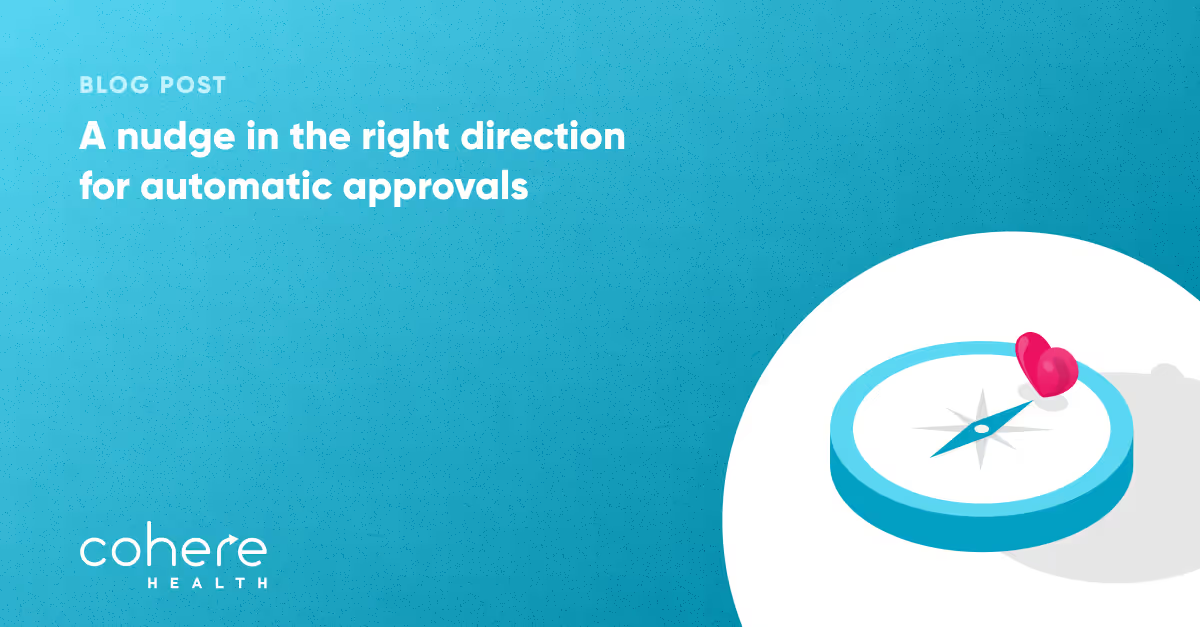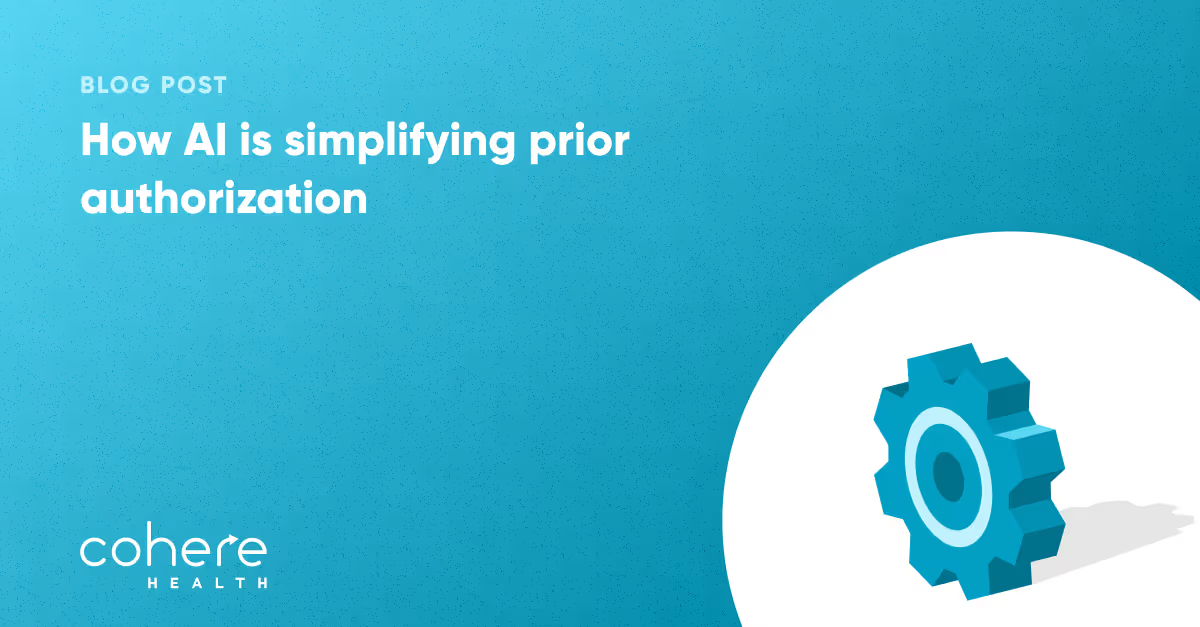A nudge in the right direction for automatic approvals
Published:
May 23, 2024

When the GPS on your phone tells you to avoid a traffic jam, it’s a relief to get that nudge in the right direction. What if providers had that same guidance to nudge them toward automatic approvals–and even toward better care? Intelligent prior authorization leverages AI-powered nudges to help providers get their patients to and through the best possible care, faster than ever.
In a recent webinar, we underscored the innovative role that nudges play in bringing health plans’ utilization management (UM) processes to the next level. This innovative technology is speeding access to appropriate care, while removing unnecessary steps and costs. Let’s dive deeper into how nudges are reshaping prior authorization and improving patient and provider experiences alike.
Physician burden by the numbers
The administrative burden of prior authorization is staggering, with 35% of physicians dedicating full-time staff solely to handle authorizations, per the American Medical Association’s annual study. Practices submit an average of 43 authorization requests per physician per week.
The clinical evidence required for an authorization varies greatly from health plan to health plan, and the criteria used are not often transparent to providers. So it’s unsurprising that requests are often incomplete (missing necessary information) or inaccurate (submitters are administrators, not clinicians). Beyond the provider burden, this delays our patients’ access to care, affects their outcomes, and often leads to treatment abandonment. 89% of surveyed physicians reported that prior authorization had a somewhat or significant negative impact on clinical outcomes.
As a practicing spine surgeon, I’m all too familiar with the weight of prior authorization’s burden–which only continues to grow within the traditional process. Instead of continually adding more staff to our practices, there’s an innovative alternative.
Diving into nudges
Nudges are real-time AI-driven notifications, integrated directly into the prior authorization workflow, that provide timely guidance to requesting providers before an authorization request is submitted. There are two key types of nudges we explored in the webinar:
- Administrative nudges prompt submitting providers to include missing information, thus increasing the likelihood that the request will be auto-approved. As a result, administrative nudges reduce care delays and providers’ time and effort spent chasing down missing information after a request is submitted.
- Clinical nudges harness AI and machine learning to align patients’ individual clinical backgrounds within the context of large data sets and suggest policy-approved, evidence-based care alternatives, like shifting the site of service from inpatient to outpatient. These nudges drive patients toward more appropriate, lower-cost care options and reduce the instance of unnecessary procedures.
A real-time nudge in the right direction
Here’s a real scenario illustrating how time-consuming the back-and-forth for missing information can be.
A week after submitting an authorization request for a lumbar fusion, I was notified of the request’s denial. My practice received a letter with the denial reasoning; the request was missing a necessary MRI. However, by the time we submitted this evidence, we were unfortunately too late to request a peer-to-peer review. Our only option was to restart the prior authorization process anew.
With intelligent prior authorization and administrative nudges, providers are notified in real time about missing clinical information, prior to submission. And for higher-risk surgical requests, we notify users of plan-specific clinical information required for approval.
The impact of these nudges for Cohere clients:
- Providers report being able to schedule patients five days faster
- 50% reduction in the number of requests with missing information year-to-date (based on missing information nudges for arthroplasty requests)
- 93% provider satisfaction due to a more efficient, streamlined process

Clinical nudges for lower cost and higher value
By implementing an intelligent prior authorization platform, health plans can actually use prior authorization transactions as levers to better collaborate with providers and align patient care with policy-approved, evidence-based care.
Clinical nudges can suggest higher-value, lower-cost services. Let’s consider another example that highlights their impact, for an inpatient lumbar spine fusion. By leveraging machine learning to access claims data, we noticed that the requesting surgeon had previously performed the same procedure on similar patients in an outpatient facility. Our machine learning models also identified this patient as a good candidate for outpatient surgery without significant increased risk.
Cohere can intelligently deploy a nudge suggesting the procedure be performed in an outpatient setting, which the provider can accept in real-time. Not only does this reduce unnecessary back and forth (if a peer-to-peer was used to suggest the same change), but it also speeds up the authorization process because in many instances, this would trigger an auto-approval.
The path forward with nudges
Nudges represent a fundamental shift in prior authorization and UM–alleviating administrative burden, driving better health plan-provider collaboration, speeding up patients’ access to care and reducing unnecessary cost. And with the CMS Interoperability and Prior Authorization Final Rule (CMS-0057-F) taking effect in just a few years, it’s critical that impacted health plans begin implementing solutions like intelligent prior authorization to solve for the rule’s provisions around turnaround times, transparency, and reducing administrative burden.
By leveraging AI-powered technologies, health plans can streamline workflows, get patients to the right care faster, and ultimately make healthcare more human. Ready to discover how nudges can transform your plan’s prior authorization processes and enhance care delivery? Watch our webinar on demand now.
Available For Download
Stay ahead with expert insights on transforming utilization management and payment integrity—delivered straight to your inbox.



